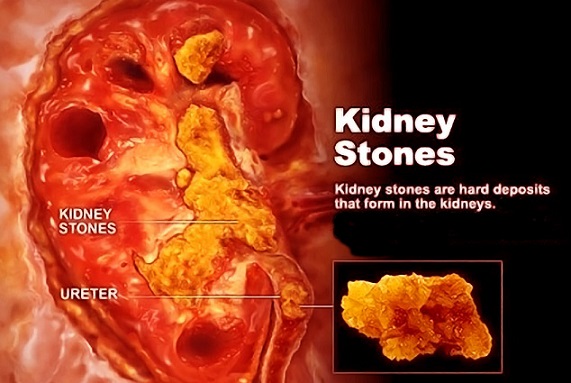BREAKING! 33 Common Drugs May Be Secretly Causing Kidney Stones in Thousands of People!
Nikhil Prasad Fact checked by:Thailand Medical News Team Mar 31, 2025 3 weeks, 1 day, 36 minutes ago
Thailand Pharma News: A startling new study by Chinese researchers has uncovered that 33 widely used medications could be silently increasing the risk of kidney stones - without any warning listed on their official drug labels. The research, conducted by Pan Ding, Qinghua Luo, and Leihua Cao from the Department of Urology at Nanchang People’s Hospital, dives deep into millions of adverse drug event reports to highlight a hidden threat that could be affecting countless patients across the globe.
 33 Common Drugs May Be Secretly Causing Kidney Stones in Thousands of People!
33 Common Drugs May Be Secretly Causing Kidney Stones in Thousands of People!
The study relied on data from the U.S. Food and Drug Administration’s Adverse Event Reporting System (FAERS), examining adverse events recorded between early 2004 and the first quarter of 2024. In this
Thailand Pharma News report, researchers specifically focused on kidney stones, or nephrolithiasis, to identify which drugs were disproportionately associated with this painful and often debilitating condition.
Kidney Stones May Be Drug-Induced and Often Go Undiagnosed
Out of over 21 million adverse event reports, the researchers found 38,307 cases involving kidney stones. These cases weren’t just random occurrences - many were strongly associated with specific medications. Patients between the ages of 18 and 65 were the most affected, with women accounting for more than half the cases. Surprisingly, over 41% of these incidents required hospitalization, and in some cases, kidney stone formation was life-threatening or even fatal.
Despite the significant impact, many of the drugs responsible for these events carry no warnings about this risk. Using a statistical method called the Reporting Odds Ratio (ROR), the researchers identified the top 50 drugs linked to kidney stones. Shockingly, 33 of these drugs met the criteria for a strong signal of association with kidney stones but had no mention of this risk in their prescribing information.
Drugs With the Highest Risk Signals
Some drugs had extremely high ROR values, indicating strong associations with kidney stone formation. Among the most concerning were:
-
Atazanavir (used for HIV): ROR 33.29
-
Topiramate (antiepileptic): ROR 8.35
-
Lansoprazole (proton pump inhibitor): ROR 7.2
-
Xywav(sodium oxybate formulation for narcolepsy): ROR 7.1
-
Teduglutide (used for short bowel syndrome): ROR 5.54
Even though these drugs are commonly prescribed for serious conditions, many clinicians and patients may be unaware of their potential to cause kidney stones - simply because it’s not listed as a known risk.
The Hidden 33 Drugs That Could Be Causing Kidney Stones
Below is the list of 50 medications that showed significant statistical association
s with kidney stone formation. Those marked with an asterisk do not currently include kidney stones as a listed adverse effect on their official labels:
Drug
Adalimumab
Infliximab*
Interferon beta-1a*
Sodium oxybate*
Teriparatide*
Etanercept*
Natalizumab*
Secukinumab*
Lenalidomide
Lansoprazole
Topiramate
tenofovir disoproxil*
Tofacitinib*
Vedolizumab*
Certolizumab pegol*
Rofecoxib
Methotrexate
Alendronate*
Dimethyl Fumarate*
Rituximab
Octreotide
Denosumab*
Abatacept*
Emtricitabine*
Ocrelizumab*
Risankizumab*
Ibrutinib*
Dupilumab
Esomeprazole*
Ustekinumab*
Apremilast*
Apixaban*
Upadacitinib*
Atazanavir
Metformin*
Ruxolitinib*
Sitagliptin*
Dalfampridine*
Fingolimod
Tocilizumab
Golimumab*
Teduglutide*
Rivaroxaban
Exenatide
Teriflunomide*
Deferasirox*
Atorvastatin
Valsartan
Xywav*
Pregabalin
These drugs work through various mechanisms that can contribute to kidney stone formation. Some - like atazanavir - have poor solubility in urine and form crystals that accumulate into stones. Others, such as topiramate, alter urine pH levels, increasing the likelihood of calcium phosphate stones. Drugs like tenofovir, which are excreted through the kidneys, may accumulate in renal tissue and affect urine composition.
Why These Findings Matter and What Patients Should Know
The revelation that so many commonly used drugs may cause kidney stones - without any warning - is alarming. Kidney stones can lead to severe pain, urinary tract infections, kidney damage, and costly hospitalizations. If physicians are unaware of this risk, especially in patients who are already vulnerable, the results could be devastating.
The study’s authors urge healthcare professionals to be more vigilant when prescribing these drugs, particularly to patients with a history of kidney stones or those prone to dehydration and electrolyte imbalances. Regular monitoring, dose adjustments, and patient education could help reduce risks.
Importantly, this study also highlights the critical role of post-marketing surveillance systems like FAERS in identifying previously unknown drug-related risks. While randomized clinical trials often focus on short-term outcomes, real-world databases capture long-term and less obvious side effects that can have significant public health consequences.
Conclusion
The study underscores the need for updated drug safety labels and broader awareness of drug-induced kidney stones. Out of 50 drugs found to have significant associations with kidney stone formation, 33 had no prior warnings - leaving patients and physicians in the dark. This hidden risk deserves urgent attention from global regulatory agencies and the medical community.
Clinicians should be cautious when prescribing medications with high stone-forming potential, especially in high-risk patients. Further research is needed to confirm the mechanisms behind drug-induced stone formation, and drug manufacturers should revise product labeling to reflect these risks. By identifying these hidden dangers, this study offers a crucial first step toward preventing avoidable suffering and improving patient outcomes.
The study findings were published in the peer reviewed journal: Frontiers in Pharmacology
https://www.frontiersin.org/journals/pharmacology/articles/10.3389/fphar.2025.1511115/full
For the latest
Thailand Pharma News, keep on logging to Thailand Medical News.
Read Also:
https://www.thailandmedical.news/news/oseltamivir-tamiflu-found-to-be-hepatoxic-and-can-cause-liver-damage-in-flu-patients
https://www.thailandmedical.news/news/canadian-study-finds-that-most-present-drugs-used-for-glaucoma-treatments-can-cause-adverse-issues
https://www.thailandmedical.news/news/gabapentin-s-alarming-impact-on-adrenal-function-and-infection-risk
https://www.thailandmedical.news/pages/thailand_doctors_listings
https://www.thailandmedical.news/articles/hospital-news
